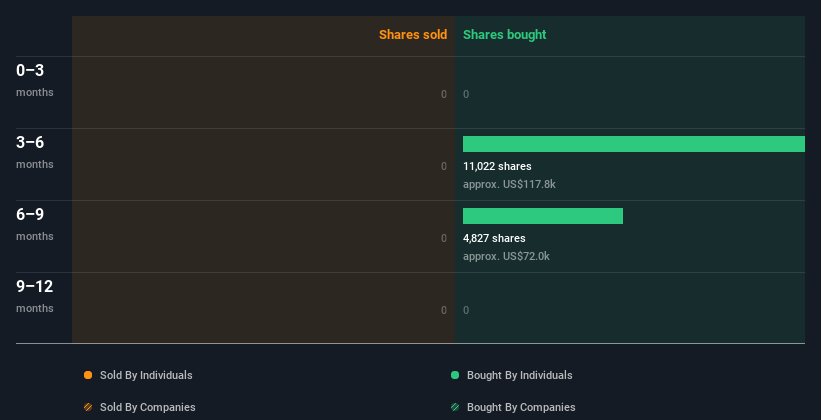CoreCard Corporation (NYSE:CCRD) insiders who bought shares over the past year were rewarded handsomely last week. The stock rose 12%, resulting in a US$14m rise in the company's market capitalisation, translating to a gain of 29% on their initial investment. As a result, their original purchase of US$191.7k worth of stock is now worth US$247.6k.
While we would never suggest that investors should base their decisions solely on what the directors of a company have been doing, we do think it is perfectly logical to keep tabs on what insiders are doing.
View our latest analysis for CoreCard
CoreCard Insider Transactions Over The Last Year
Over the last year, we can see that the biggest insider purchase was by Chairman James Strange for US$76k worth of shares, at about US$10.80 per share. Although we like to see insider buying, we note that this large purchase was at significantly below the recent price of US$15.62. Because the shares were purchased at a lower price, this particular buy doesn't tell us much about how insiders feel about the current share price.
While CoreCard insiders bought shares during the last year, they didn't sell. They paid about US$12.10 on average. It is certainly positive to see that insiders have invested their own money in the company. However, we do note that they were buying at significantly lower prices than today's share price. You can see the insider transactions (by companies and individuals) over the last year depicted in the chart below. If you want to know exactly who sold, for how much, and when, simply click on the graph below!

CoreCard is not the only stock insiders are buying. So take a peek at this free list of under-the-radar companies with insider buying.
Insider Ownership Of CoreCard
For a common shareholder, it is worth checking how many shares are held by company insiders. Usually, the higher the insider ownership, the more likely it is that insiders will be incentivised to build the company for the long term. Insiders own 27% of CoreCard shares, worth about US$31m. While this is a strong but not outstanding level of insider ownership, it's enough to indicate some alignment between management and smaller shareholders.
So What Do The CoreCard Insider Transactions Indicate?
It doesn't really mean much that no insider has traded CoreCard shares in the last quarter. However, our analysis of transactions over the last year is heartening. Insiders own shares in CoreCard and we see no evidence to suggest they are worried about the future. While we like knowing what's going on with the insider's ownership and transactions, we make sure to also consider what risks are facing a stock before making any investment decision. In terms of investment risks, we've identified 3 warning signs with CoreCard and understanding these should be part of your investment process.
If you would prefer to check out another company -- one with potentially superior financials -- then do not miss this free list of interesting companies, that have HIGH return on equity and low debt.
For the purposes of this article, insiders are those individuals who report their transactions to the relevant regulatory body. We currently account for open market transactions and private dispositions of direct interests only, but not derivative transactions or indirect interests.
New: AI Stock Screener & Alerts
Our new AI Stock Screener scans the market every day to uncover opportunities.
• Dividend Powerhouses (3%+ Yield)
• Undervalued Small Caps with Insider Buying
• High growth Tech and AI Companies
Or build your own from over 50 metrics.
Have feedback on this article? Concerned about the content? Get in touch with us directly. Alternatively, email editorial-team (at) simplywallst.com.
This article by Simply Wall St is general in nature. We provide commentary based on historical data and analyst forecasts only using an unbiased methodology and our articles are not intended to be financial advice. It does not constitute a recommendation to buy or sell any stock, and does not take account of your objectives, or your financial situation. We aim to bring you long-term focused analysis driven by fundamental data. Note that our analysis may not factor in the latest price-sensitive company announcements or qualitative material. Simply Wall St has no position in any stocks mentioned.
About NYSE:CCRD
CoreCard
Provides technology solutions and processing services to the financial technology and services market in the United States, Europe, and the Middle East.
Flawless balance sheet with proven track record.
Market Insights
Community Narratives



